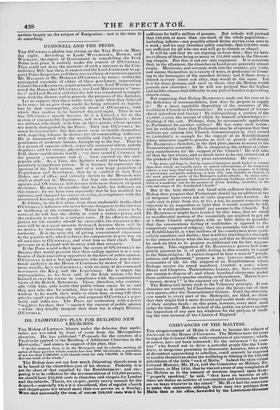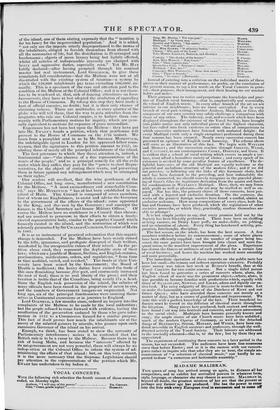GRIEVANCES OF THE MALTESE.
THE misgovernment of Malta is about to become the subject of discussion in the House of Commons. The Maltese have for years besieged the Colonial Office with complaints of grievances; which, of course, have not been redressed; for the statesmen " by cour- tesy" who feared not to drive a powerful people like the Cana- dians, in dangerous proximity to democratic America, into a state of discontent approaching to rebellion, could scarcely be expected to trouble themselves about the wellbeing or illbeing of the 120,000 inhabitants of the little "rock of Malta.' Indeed the then virtual Colonial Minister, Mr. HAY, told the Committee on Military Ex- penditure, in May 1834, that he was not aware of any complaints of the Maltese as to the amount of taxation imposed upon them: " properly speaking," he said, "they have no taxation at all there are duties on articles of consumption and licences, but there are no taxes whatever in the island." Mr. HAY had the assurance to make this statement, although there were two petitions from Malta then in his office, forwarded by the Lieutenant-Governor of the island, one of them stating expressly that the " taxation is far too heavy for the impoverished population:. And it is added, 4' not only are the imposts utterly disproportioned to the means of
the inhabitants, obliged to furnish themselves from abroad with all the necessaries of life, but the distribution is ill-arranged and burdensome ; objects of mere luxury being but lightly affected, whilst all articles of indispensable necessity are charged with heavy and oppressive duties, especially corn." Yet Mr. HAY boldly declared—after having promised through his nominal master but real instrument, Lord GonmittcH, to give these complaints full consideration—that the Maltese were not at all dissatisfied with the existing system of taxation—a system by which the 120,000 inhabitants pay taxes exceeding 100,000/. an- nually. This is a specimen of the care and attention paid to the
condition of the Maltese at the Colonial Office; and it is not there- fore to be wondered at, that, sick of dancing attendance on bunt- burealterals, they have at last adopted the resolution of appealing to the House ofeonmions. By taking this step they have made a host of official enemies, no doubt ; but it is their only chance of
obtaining redress. There are multitudes in every quarter of the globe who will tell them, that the way to gain attention from the
magnates who rule our Colonial empire, is to badger them con- stantly with Parliamentary motions for inquiry, which are gene- rally equivalent to motions for exposure of gross misconduct. Experience has not been lost upon the Maltese : they have put into Mr. EWART'S hands a petition, which that gentleman will
present to the House of Commons on the 17th instant. We
learn from a pamphlet sent to us by Mr. GEORGE Mentovicsi, the indefatigable agent in London for his oppressed fellow coun- trymen, that the signatures to this petition amount to 2357, in- cluding those of nearly all the principal inhabitants of the island. The first grievance to which they direct attention is, indeed, a fundamental one—" the absence of a free representation of the
wants of the people;" and as a principal remedy for all the evils under which they suffer, they pray for the "power to elect Repre- sentatives, for the object of stating their wants, and preserving them in future against any infringement which may be attempted on their rights." Our readers will recollect, that the wise gentlemen of the Colonial Office, not long since, manufactured a new constitution for the Maltese. "A most extraordinary and remarkable Coun-
cil," says Mr. MITROVICH " has at last been established in the island of Malta. This Council is composed of seven members, four of whom are Englishmen, to assist and advise the Governor in the government of the affairs of the island ; some appointed by the King, and the, rest by the Governor ; and amongst the
former, is the Chief Secretary and Senior Military Officer." Of course the Maltese have no confidence in a Council thus chosen; and are resolved to persevere in their efforts to obtain a freely-
elected representative body, similar to the popular Council which formerly existed in the island, and the restoration of which was solemnly guaranteed by Sir CH MILE S CAMERO N, Governor of Malta in 1801.
It is as an instrument of practical reformation that this organic rhange is demanded. For the Maltese have been nearly ruined
by the folly, ignorance, and profligate disregard of their welfare, manifested by the irresponsible rulers of their island. In the pe- tition above cited, they represent the deplorable state of their laws; which are a jumble of Roman, Sicilian, and English statutes,
proclamations, notifications, orders, and regulations, " from time to time modified, varied, and revoked." The funds of their Uni-
versity have been seized by the Government; the Board of
Health is inefficient; the heavy duties have ruined the trade of this once flourishing because free port, and enormously increased
the cost of food; there is no real liberty of the press; and their taxation is treble that of the Canadians, being nearly 17s. a head. Since the English took possession of the island, the salaries of many officials have been raised in the proportion of seven to one, and the numbers of Government hangers-on augmented. Not long ago, six of the principal functionaries were amusing them- selves in Continental excursions or in journies to England.
Lord GLENELG, a few months since, ordered an inquiry into the complaints of the Maltese to be made by the local authorities ;
but the people refused to come forward with evidence, having the recollection of the persecution endured by those who gave infor-
mation in 1812 to a Commission formed for a similar purpose. This fact of itself proves how much the inhabitants are at the mercy of the salaried gainers by misrule, who pounce upon each successive Governor of the island on his arrival.
Enough, we think, has been stated to show the necessity of Parliamentary interference; unless it be contended that the British rule is to be a curse to the Maltese. Because there is no risk of losing Malta, and because the " interests" affected by its misgovernment are not very powerful, there will always be an indisposition at the Colonial Office to reform the system of ad- inistering the affairs of that island : but, on this very account, it is the more necessary that the Supreme Legislature should pay attention to the representations of the petition which Mr. EWART has undertaken to lay before it.



























 Previous page
Previous page